View in other NatureServe Network Field Guides
NatureServe
Montana
Utah
Wyoming
Idaho
Wisconsin
British Columbia
South Carolina
Yukon
California
New York
Dense-leaved Pussytoes - Antennaria densifolia
State Rank Reason (see State Rank above)
Known from one high elevation site in the Anaconda-Pintler Wilderness on the border of Deerlodge and Granite counties. The single occurrence is in a designated wilderness, which should protect it from most human-caused disturbance. However, it is susceptible to trail-building and maintenance activities.
General Description
Dense-leaved Antennaria is a low, mat-forming perennial with stems which are 2-6 cm high and which spread by prostrate runners from a branched rootcrown clothed in old leaf bases. The broadly spoon-shaped basal leaves are 3-6 mm long, while the alternate stem leaves are shorter and narrowly lance-shaped with small, curled tips. The foliage is densely covered with long white hairs. 2-5 flower heads are borne atop the stems, and male and female flowers are borne on different plants. Female flower heads have 3-4 series of overlapping, narrowly lance-shaped involucral bracts which are 4-5 mm long with brownish, papery tips, in addition to having white disk flowers which are ca. 3 mm long. Ray flowers are lacking. Male heads are slightly broader with shorter involucral bracts. The seed has long, stiff bristles at the top.
Phenology
Flowering primarily in July.
Diagnostic Characteristics
There are many species of small-leaved, mat-forming Antennaria. Only 2 other species have papery tips of involucral bracts that are brownish: A. umbrinella has longer, more lance-shaped leaves, and A. aromatica has foliage with glandular hairs and basal leaves that are usually greater than 6 mm long. A hand lens is necessary to discern the diagnostic characters.
Species Range
Montana Range
Range Descriptions
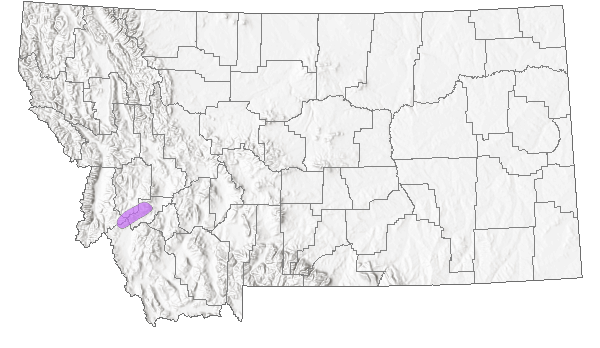
 Native
Native
Range Comments
AK to MT (Lesica et al. 2012. Manual of Montana Vascular Plants. BRIT Press. Fort Worth, TX).
Observations in Montana Natural Heritage Program Database
Number of Observations: 9
(Click on the following maps and charts to see full sized version)
Map Help and Descriptions
Relative Density
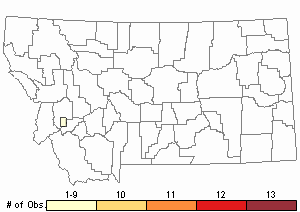
Recency
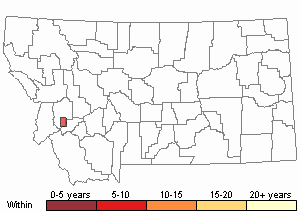
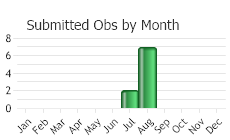
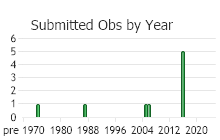
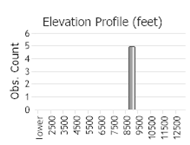 (Observations spanning multiple months or years are excluded from time charts)
(Observations spanning multiple months or years are excluded from time charts)
Habitat
Gravelly, (limestone), gently-sloping, alpine tundra.
National Vegetation Classification System Groups Associated with this Species
Alpine
Alpine - Sparse and Barren
Alpine - Vegetated
Ecology
POLLINATORS The following animal species have been reported as pollinators of this plant species or its genus where their geographic ranges overlap:
Bombus pensylvanicus (Colla and Dumesh 2010).
Stewardship Responsibility
Threats or Limiting Factors
STATE THREAT SCORE REASON
Threat impact not assigned because threats are not known (MTNHP Threat Assessment 2021).
References
- Literature Cited AboveLegend:
 View Online Publication
View Online Publication Colla, S.R. and S. Dumesh. 2010. The bumble bees of southern Ontario: notes on natural history and distribution. Journal of the Entomological Society of Ontario 141:39-68.
Colla, S.R. and S. Dumesh. 2010. The bumble bees of southern Ontario: notes on natural history and distribution. Journal of the Entomological Society of Ontario 141:39-68. Lesica, P., M.T. Lavin, and P.F. Stickney. 2012. Manual of Montana Vascular Plants. Fort Worth, TX: BRIT Press. viii + 771 p.
Lesica, P., M.T. Lavin, and P.F. Stickney. 2012. Manual of Montana Vascular Plants. Fort Worth, TX: BRIT Press. viii + 771 p. MTNHP Threat Assessment. 2021. State Threat Score Assignment and Assessment of Reported Threats from 2006 to 2021 for State-listed Vascular Plants. Botany Program, Montana Natural Heritage Program, Helena, Montana.
MTNHP Threat Assessment. 2021. State Threat Score Assignment and Assessment of Reported Threats from 2006 to 2021 for State-listed Vascular Plants. Botany Program, Montana Natural Heritage Program, Helena, Montana.
- Additional ReferencesLegend:
 View Online Publication
View Online Publication
Do you know of a citation we're missing? Achuff, P. L. and L. S. Roe. 1992. Botanical survey of the Goat Flat proposed Research Natural Area, Deerlodge National Forest. Unpublished report to the Deerlodge National Forest. Montana Natural Heritage Program, Helena, MT. 31 pp.
Achuff, P. L. and L. S. Roe. 1992. Botanical survey of the Goat Flat proposed Research Natural Area, Deerlodge National Forest. Unpublished report to the Deerlodge National Forest. Montana Natural Heritage Program, Helena, MT. 31 pp. Bayer, R.J. 1989. A Systematic and Phytogeographic Study of Antennaria aromatica and A. densifolia...madrono.
Bayer, R.J. 1989. A Systematic and Phytogeographic Study of Antennaria aromatica and A. densifolia...madrono. Bayer, R.J. 1989. Patterns of isozyme variation in western North American Antennaria (Asteraceae: inuleae) II. Diploid and polyploid species of section Alpinae. American Journal of Botany 76:679-691.
Bayer, R.J. 1989. Patterns of isozyme variation in western North American Antennaria (Asteraceae: inuleae) II. Diploid and polyploid species of section Alpinae. American Journal of Botany 76:679-691. Lesica, P., M.T. Lavin, and P.F. Stickney. 2022. Manual of Montana Vascular Plants, Second Edition. Fort Worth, TX: BRIT Press. viii + 779 p.
Lesica, P., M.T. Lavin, and P.F. Stickney. 2022. Manual of Montana Vascular Plants, Second Edition. Fort Worth, TX: BRIT Press. viii + 779 p. Montana Natural Heritage Program. 1999. April 1 - last update. Species Information: Antennaria densifolia. Montana Natural Heritage Program.
Montana Natural Heritage Program. 1999. April 1 - last update. Species Information: Antennaria densifolia. Montana Natural Heritage Program.
- Web Search Engines for Articles on "Dense-leaved Pussytoes"





